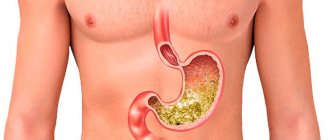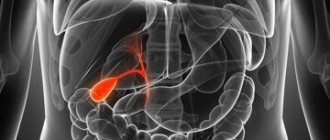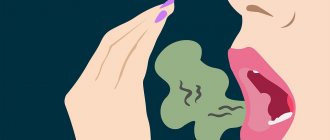Most people are not even aware that they have bad breath. Due to the structural features of the human nasopharynx and oral cavity, it is almost impossible to independently assess the freshness of breath. Since a person cannot smell his breath, its freshness can only be assessed by the reaction of others.
Bad breath can have one or more causes. It is important to determine whether bad breath is your constant companion or a temporary phenomenon.
The cause of temporary bad breath may be the consumption of certain foods. Usually, exotic spicy dishes, fatty sauces, onions, garlic, etc. have a negative effect on breathing. Thus, you can get rid of the smell simply by brushing your teeth. By performing regular oral hygiene after meals, you can completely eliminate the possibility of an unpleasant odor. If the appearance of bad breath is not associated with food consumption, there are several main reasons for its occurrence.
Bad breath: causes
Where do halitosis legs grow from? There are many factors here:
- Caries and its complications (pulpitis, periodontitis, periostitis and other inflammatory dental diseases).
- Periodontitis and periodontal disease. Periodontal pockets accumulate plaque and microorganisms, as well as decaying food debris.
- Inflammatory diseases of the oral mucosa
- Pathologies of the ENT organs (sinusitis, laryngitis, tracheitis), as well as rhinitis
- Dry mouth. Insufficient saliva production leads to disruption of the self-cleaning process, which creates excellent conditions for the proliferation of bacteria (remember what your breath smells like in the morning, because there is little saliva at night). Their waste products create an unpleasant odor. A similar situation occurs with nasal congestion and forced breathing through the mouth when the mucous membrane dries out.
- Diseases of internal organs (especially the gastrointestinal tract).
- Parasitic infestation
- Poor oral hygiene
- Improper care of dental structures (braces, dentures).
A consultation with a dentist and, if necessary, doctors of other specialties will help you find out the true cause of the unpleasant odor. You may need to undergo additional examination (for example, FEGDS if gastritis or a stomach ulcer is suspected, or scraping for inflammatory diseases of the mucous membrane).
Causes of rotten burps
In most cases, the prerequisite for the occurrence of erection, which has an unpleasant odor, is inflammatory and non-inflammatory diseases of the gastrointestinal tract and hepatobiliary system. Rotten belching occurs with congenital intolerance to carbohydrates - lactose and fructose due to enzyme deficiency. The cause of regurgitation of gases with the smell of hydrogen sulfide can be intestinal helminthiasis and giardiasis. Sometimes rotten erection is observed with functional dyspepsia and is associated with disruption of the processes of movement of chyme through the digestive tract.
Errors in nutrition
Physiological causes of rotten belching include excessive consumption of foods containing sulfur: meat and eggs, dairy and plant products (legumes, cabbage). It is this microelement that causes the foul odor of belched gastric gases. The likelihood of erection increases with the simultaneous intake of carbonated drinks, which cause excessive formation of carbon dioxide in the stomach and stretching of its walls, and the consumption of indigestible proteins that linger in the stomach.
Stomach diseases
The appearance of putrefactive erection is due to two main reasons: a decrease in the secretion of hydrochloric acid and stagnation of contents in the stomach. In a hypoacid state, the processes of activation of digestive enzymes are disrupted, fermentation reactions develop, which are accompanied by the release of hydrogen sulfide gas with an unpleasant rotten odor. When food masses stagnate in the stomach due to atony of smooth muscles or spasm of the pylorus, rotting of food also occurs, which causes foul-smelling belching. Regurgitation of rotten things is provoked by:
- Chronic atrophic gastritis
. Progressive atrophy of glandular epithelial cells and mucous membrane causes a decrease in the production of hydrochloric acid with impaired digestion of protein products. Rotten erection is associated with excessive stretching of the walls of the organ, fermentation and stagnation of food masses. With low acidity, secondary bacterial flora joins, which aggravates the patient’s condition. - Achlorhydria
. As a result of the absence of free hydrochloric acid, digestive enzymes are not activated, so chyme lingers in the stomach for a long time, where fermentation processes occur. The situation is aggravated by the addition of disturbances in the motor function of the organ and its stretching, which is accompanied by belching with a taste of rotten eggs. The disease is characterized by nausea, heaviness in the abdomen, and flatulence. - Atony of the stomach
. Impaired contractility of the gastric muscles leads to a decrease in both motor and secretory activity of the organ. This provokes prolonged stagnation of partially digested food, which causes distension of the stomach and regurgitation of gases. Rotten belching is often combined with discomfort and a feeling of heaviness in the abdominal cavity, worsening after eating. - Gastroptosis
. Eructation during gastric prolapse often occurs in the later stages of the disease and is associated with significant hypotension of the organ and compression of the duodenum, which potentiates stagnation of the contents. The clinical picture includes chronic constipation, nausea, and a feeling of early satiety. If gastroptosis is combined with damage to the underlying parts of the gastrointestinal tract, intestinal symptoms may occur. - Pyloric stenosis
. The combination of rotten erection with heaviness in the abdomen, loss of appetite, and weight loss is typical even for the compensated stage of the disease. As pyloric stenosis progresses, daily vomiting is observed; in severe cases, it occurs after each meal, while the vomit contains a large amount of incompletely digested foods. In the decompensated stage, severe exhaustion is noted. - Adenocarcinoma of the stomach
. Rotten belching with an unpleasant odor is typical of a large tumor, which is localized in the pyloric part of the organ. The neoplasm prevents the evacuation of chyme into the cavity of the duodenum, causing overstretching of the gastric wall and decreased motility. The symptom is combined with other dyspeptic disorders: intense epigastric pain, stool disorders, lack of appetite.
Pathology of the pancreaticoduodenal zone
Diseases of the duodenum and pancreas often manifest as putrid belching. It can occur as a result of disturbances in duodenal motility, which provokes stagnation of contents and activation of fermentation processes. Rotten erection in pathological conditions of the pancreas mainly develops as a result of enzymatic deficiency, which leads to impaired digestion and absorption of food ingredients, stagnation of chyme in the intestines. The symptom is characteristic of diseases such as:
- Duodenal stenosis
. Narrowing of the lumen of the duodenum of organic or functional origin inevitably leads to a slowdown in the passage of digestive masses through the intestine with stretching of the overlying sections. This causes contraction of the gastric muscles and potentiates putrefactive erection. Often rotten belching is combined with regurgitation of gastric contents and profuse vomiting, after which the patient’s condition improves. - Duodenostasis
. When chyme stagnates in the duodenum, pressure in the upper gastrointestinal tract increases, and the muscles of the stomach and esophagus reflexively contract, causing belching. The rotten smell is associated with the processes of rotting proteins and fermentation, caused by a decrease in the synthesis of enzymes. Eructation is combined with nausea, bloating and rumbling in the stomach. Vomiting often begins after eating and brings relief to patients. - Pancreatitis
. Regurgitation of putrefactive gases is more typical of chronic pancreatitis, in which the exocrine function of the pancreas always worsens. If there is insufficiency of digestive enzymes, the processes of breakdown and absorption of proteins, fats, and carbohydrates are disrupted. Undigested food lingers in the intestines for a long time, causing it to stretch, reflex belching, and regurgitation of chyme.
Intestinal diseases
Rotten belching in intestinal pathology is associated with a reflex reaction of the smooth muscle of the gastric wall to stagnation of fecal matter. The resulting unpleasant odor is caused by the processes of rotting and decomposition caused by the activation of opportunistic microorganisms living in the large intestine. Rotten erection can be observed with enteropathies of various origins, which are accompanied by disturbances in the digestive processes, increased pressure inside the intestines and stomach due to increased gas formation.
- Chronic enterocolitis
. Belching during inflammatory processes in the intestines is caused by both impaired digestion and changes in the rate of passage of chyme. Regurgitation of foul-smelling gas is often combined with polymorphic clinical symptoms: abdominal pain, discomfort, stool disorders (diarrhea or constipation), nausea and vomiting. In severe situations, stool retention occurs with the release of blood and mucus from the anus. - Celiac disease.
Atrophy of the small intestinal mucosa and concomitant malabsorption of nutrients lead to polymorphic dyspeptic disorders. With celiac disease, rotten belching develops as a result of increased gas formation in the intestines, a violation of the coordinated contractions of the pyloric and cardiac sphincters. Patients are also worried about diarrhea, diffuse abdominal pain, and often experience nausea and vomiting. - Dysbacteriosis
. The predominance of opportunistic microflora in the small and large intestines causes rotting and fermentation of chyme, which culminates in the formation of foul-smelling gases. Rotten erection occurs in response to overstretching of the walls of the digestive tract. Patients may complain of disturbances in stool frequency and stool consistency, abdominal pain, and nausea. With a long course of dysbiosis, a decrease in appetite and weight loss are possible. - Intestinal polyps
. Putrid regurgitation is observed with large benign epithelial neoplasms that cause mechanical obstruction of the intestinal lumen. The involuntary release of putrefactive gases is associated with a reflex contraction of the smooth muscles of the stomach during stretching and slow emptying of the intestinal tract. Rotten belching is often combined with cramping pain in the abdomen. - Colorectal cancer
. Eructation in malignant neoplasia is associated with both mechanical obstruction of the colon and disruption of the intramural autonomic ganglia. Constant constipation is accompanied by insufficiency of the bauhinium valve and the reflux of fecal contents into the overlying sections of the gastrointestinal tract. Belching sometimes develops against the background of pain in the left half of the abdomen and bleeding from the rectum. - Pneumatosis intestinalis
. The formation of air cavities in the colon wall slows down peristaltic contractions and causes stool retention. Chronic constipation leads to the development of belching of putrefactive gases, which appear during the decomposition of feces and the formation of toxic products. Stool retention may be replaced by diarrhea with a large amount of mucus in the stool. Patients are also concerned about nausea and vomiting.
Intestinal obstruction
Stagnation of feces in the intestine, caused by mechanical obstruction or damage to the autonomic innervation, in the early stages is manifested by belching of air, which quickly acquires a fetid odor. Reflex regurgitation is caused by increased pressure in the intestines and stomach, insufficiency of the obturator function of the bauhinium valve, leading to retrograde movement of feces. As the process progresses, duodenogastric reflux is formed, resulting in fecal vomiting.
Diseases of the hepatobiliary system
Various diseases of the liver and biliary tract are usually accompanied by bitter belching, which occurs due to excessive flow of bile into the duodenum. In chronic diseases combined with malabsorption and maldigestion syndrome, regurgitation may acquire a rotten smell. More often, regurgitation of foul-smelling gases is observed with hypomotor dyskinesia of the bile ducts, chronic cholecystitis, and liver cysts. Belching is usually accompanied by nagging pain and discomfort in the right hypochondrium, and decreased appetite.
The root of the problem is microorganisms
Why is bad breath so persistent and appears again and again? To deal with the problem, you need to understand the mechanism of its occurrence as a whole. As you know, the mouth is a “home” for many bacteria, microorganisms, and fungi. Naturally, like all living organisms, they feed and excrete waste products. The more plaque there is on the teeth, the more comfortable the bacteria feel, because their preferred environment is oxygen-free, and just such conditions are created under the layer of plaque. Microorganisms produce sulfur compounds, which have a pungent odor and feel repulsive. It is noteworthy that even if a person brushes his teeth thoroughly, in some cases (for example, progressive periodontal disease), deep periodontal pockets cannot be cleaned out on their own, and they become a source of foul odor. The same applies to plugs with purulent tonsillitis, when white lumps of pus accumulate in the lacunae of the tonsils.
Bad breath in a child
In children, this problem is less common than in adults, because, as a rule, the average child has not yet developed chronic diseases of the gastrointestinal tract, and not all teeth have erupted. But what to do if you notice your child has bad breath? The reasons here are the same as in adults: in this way the body signals problems in the body. This means that there is a failure somewhere and a full examination needs to be carried out. In children of preschool and school age, adenoids may be a predisposing factor. The scheme is simple: adenoid growths block the path of air / breathing from the nose is replaced by the mouth / the mucous membrane dries out / saliva becomes scarce and bacteria multiply, giving rise to repulsive breathing. What if it’s just a baby? Many mothers are interested in what could be the cause of the problem if the child is one year old. Bad breath at this age can already appear due to the accumulation of plaque on the teeth (the norm is 8 by the age of one), the presence of worms, and the abuse of carbohydrate foods (cookies, sweets).
Important! You should be wary if you smell acetone from your mouth. You should contact an endocrinologist to be examined for diabetes and other electrolyte disorders.
Diaphragmatic hernia
The diaphragm, separating the chest and abdominal cavities, is equipped with a special opening. The esophagus passes through it. However, with a hernia of the diaphragm, the described hole becomes too wide. Because of this, the esophagus, normally partially located in the abdominal cavity, moves higher.
What are the consequences of such a violation? Due to the uncharacteristic bends of the esophagus, as well as its specific location, the likelihood of gastric juice entering this organ increases significantly. Well, we have already mentioned what this leads to when talking about gastroesophageal reflux and chalasia cardia.
How to get rid of bad breath
First, assess the scale of the problem. Bad breath in the morning after sleep is normal. To get rid of it, regular morning hygiene procedures (brushing your teeth, rinsing) are enough. If the reason is raging bacteria, it will be more difficult, but it is also possible to pacify them. What measures will be effective? How to remove bad breath and forget about the problem?
1) Diet correction.
The more protein foods you consume, the worse the “flavor”. By depriving bacteria of the ability to emit foul-smelling gases, you can significantly reduce the size of the enemy army. “More plant-based - less meat” - stick to this motto and you will notice an improvement from the very first days
2) Careful oral hygiene
Fortunately, the modern dental industry offers a huge number of teeth and gum care products for every taste and budget. Feel free to use ultrasonic brushes, irrigators, rinses, and flosses. To develop motivation in children, you can buy brushes in the shape of funny animals and organize competitions - who can brush their teeth better today? For those who wear braces or use dentures, we inform you (in case you didn’t know): there is a special series of care products for orthodontic structures (brushes, special brushes, etc.) that make dental care easier. Regular hygiene measures cleanse the oral cavity of bacteria and freshen breath. Don't forget about professional cleaning at the dentist every six months.
3) Stop smoking
Smokers do not notice how foul their breath is, and neither expensive cigarettes, nor lollipops, nor chewing gum can help. But others notice this very well. Leaving aside morals about the dangers of smoking, let's just say whether or not you smell decaying tobacco and the products of another 5,000 chemical compounds (there are about that many in cigarette smoke), it's up to you.
3) Eliminate the main problem
If the problem is in any specific disease, then no amount of rinsing or chewing gum will be able to remove halitosis; at most, they will mask it for a short time. Eliminate foci of infection in the oral cavity, treat your teeth, cure your stomach, tonsils, in other words, take care of all those health matters that you “didn’t get around to”, and the problem of unpleasant odor will be eliminated in parallel with the main treatment.
Which doctor should I contact?
If an unpleasant odor appears, the first step should be a visit to the dentist. This doctor will be able to help in the vast majority of cases. If no problem is detected, it is the turn of a nutritionist and gastroenterologist. Most likely, in this case, you will have to take additional blood and urine tests. Depending on the results obtained, a specific specialist will treat the problem: for problems with the thyroid gland - an endocrinologist, for kidney diseases - a urologist, for pathologies of the respiratory system - an ENT specialist or a pulmonologist.
You can get rid of an unpleasant odor only by establishing an accurate diagnosis. Therefore, if the problem persists longer than 2-3 days, it’s time to start an examination!
The information is for reference only. Before treatment, consultation with a doctor is necessary.
Prevention is everything!
If you think that you have overcome bad breath, the treatment is over and you can relax - you are mistaken. It can come back very quickly, so listen to simple recommendations.
Helpful tips for fresh breath:
- Drink more water.
Sufficient intake of water into the body ensures a high dissolving ability of saliva and washing away germs. - Consume more solid fruits and vegetables.
Fruits and vegetables serve as a kind of “grater” for plaque, removing it from the surface of the teeth. Less plaque - less odor! - Stimulate salivation.
This can be achieved by chewing something. Not necessarily chewing gum. Saliva production increases when chewing certain seeds and fruits with essential oils, such as cloves, parsley, mint.
In conclusion, we would like to remind you that in ancient times, based on the smell from the mouth, people could form an idea about a person, including their character traits. Subconsciously, this happens even today. There is only one conclusion - it’s better to take care of your health, this is reasonable from all points of view, as you have already seen.
Chalazia cardia
Gastroesophageal reflux is the reflux of gastric juice into the esophagus.
The cardia is the gastric muscular valve that connects this organ to the esophagus.
Its dysfunction (chalasia) leads to the fact that digestive juices enter cavities not intended for them. Usually this is the esophagus.
As a result, a condition with symptoms reminiscent of gastroesophageal reflux occurs.
Unlike the mentioned disease, chalazia cardia develops as an independent disease. This disorder has nothing to do with gastritis.










